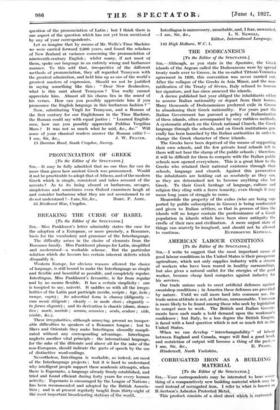BREAKING THE CURSE OF BABEL
[To the Editor of the SPECTATOR.] S1R,—Miss Pankhurst's letter admirably states the case for the adoption of a European, or more precisely, a Romance, basis for the vocabulary and grammar of the Interlanguage.
The difficulty arises in the choice of elements from the Romance family. Miss Pankhurst plumps for Latin, simplified and modernised—a workable scheme. But the particular solution which she favours has certain inherent defects which disqualify it.
Western Europe, for obvious reasons allowed the choice of language, is still bound to make the Interlanguage as simple and flexible and beautiful as possible, and completely regular. Interlingua, Miss Pankhurst's favourite, is far from regular and by no means flexible. It has a certain simplicity : one is tempted to say, naivete. It saddles us with all the irregu- larities of the Latin past participle (scribe, script° ; lege, lecto ; rumpe, rupto) ; its adverbial form is clumsy (diligently = cunt mente diligente ; clearly = in mode claro ; elegantly = in forma elegante) ; and its derivation is chaotic (domo, domes- flea ; made, mortale ; ocean, oceanico ; oculo, oculare ; vide, visible, &c.).
These irregularities, although annoying, present no insuper- able difficulties to speakers of a Romance tongue ; but to Slays and Orientals they make Interlingua absurdly compli- cated without any corresponding advantage. Interlingua neglects another vital principle : the international language, for the sake of the illiterate and above all for the sake of the non-European, should indicate the parts of speech by the use of distinctive word-endings.
Nevertheless, Interlingua is workable, as indeed, are most of the Interlanguage projects ; but it is hard to understand. why intelligent people support these academic attempts, when there is Esperanto, a language already firmly established, and tried and found efficient during forty years for every human activity: Esperanto is encouraged by the League of Nations ; has been recommended and adopted by the British Associa- tion ; and is at present regularly taught from thirty-eight of the most important broadcasting stations of the world.
Interlingua is unnecessary, unsuitable, and, I fear, unwanted.






































 Previous page
Previous page